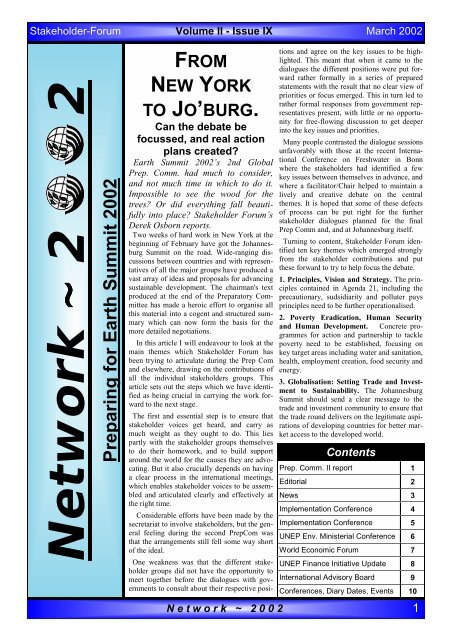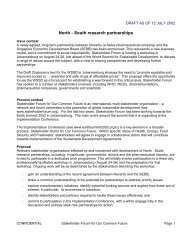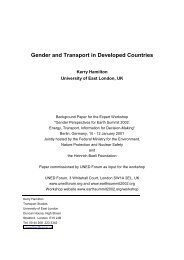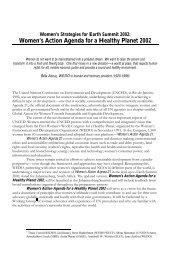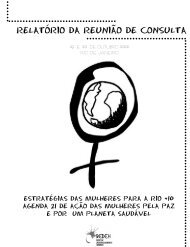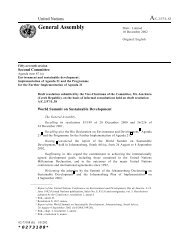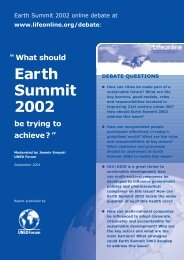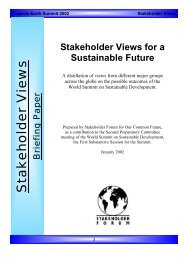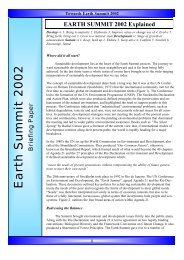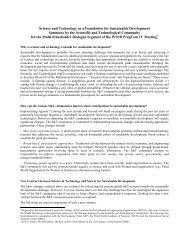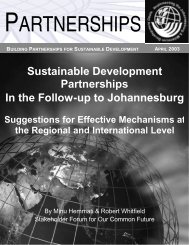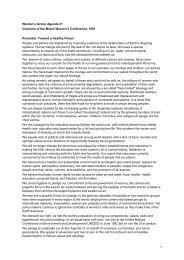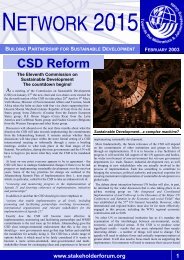Issue 19.pdf - Earth Summit 2002
Issue 19.pdf - Earth Summit 2002
Issue 19.pdf - Earth Summit 2002
You also want an ePaper? Increase the reach of your titles
YUMPU automatically turns print PDFs into web optimized ePapers that Google loves.
Stakeholder-Forum Volume II - <strong>Issue</strong> IX March <strong>2002</strong><br />
Network ~ 2 2<br />
Preparing for <strong>Earth</strong> <strong>Summit</strong> <strong>2002</strong><br />
FROM<br />
NEW YORK<br />
TO JO’BURG.<br />
Can the debate be<br />
focussed, and real action<br />
plans created?<br />
<strong>Earth</strong> <strong>Summit</strong> <strong>2002</strong>’s 2nd Global<br />
Prep. Comm. had much to consider,<br />
and not much time in which to do it.<br />
Impossible to see the wood for the<br />
trees? Or did everything fall beautifully<br />
into place? Stakeholder Forum’s<br />
Derek Osborn reports.<br />
Two weeks of hard work in New York at the<br />
beginning of February have got the Johannesburg<br />
<strong>Summit</strong> on the road. Wide-ranging discussions<br />
between countries and with representatives<br />
of all the major groups have produced a<br />
vast array of ideas and proposals for advancing<br />
sustainable development. The chairman's text<br />
produced at the end of the Preparatory Committee<br />
has made a heroic effort to organise all<br />
this material into a cogent and structured summary<br />
which can now form the basis for the<br />
more detailed negotiations.<br />
In this article I will endeavour to look at the<br />
main themes which Stakeholder Forum has<br />
been trying to articulate during the Prep Com<br />
and elsewhere, drawing on the contributions of<br />
all the individual stakeholders groups. This<br />
article sets out the steps which we have identified<br />
as being crucial in carrying the work forward<br />
to the next stage.<br />
The first and essential step is to ensure that<br />
stakeholder voices get heard, and carry as<br />
much weight as they ought to do. This lies<br />
partly with the stakeholder groups themselves<br />
to do their homework, and to build support<br />
around the world for the causes they are advocating.<br />
But it also crucially depends on having<br />
a clear process in the international meetings,<br />
which enables stakeholder voices to be assembled<br />
and articulated clearly and effectively at<br />
the right time.<br />
Considerable efforts have been made by the<br />
secretariat to involve stakeholders, but the general<br />
feeling during the second PrepCom was<br />
that the arrangements still fell some way short<br />
of the ideal.<br />
One weakness was that the different stakeholder<br />
groups did not have the opportunity to<br />
meet together before the dialogues with governments<br />
to consult about their respective positions<br />
and agree on the key issues to be highlighted.<br />
This meant that when it came to the<br />
dialogues the different positions were put forward<br />
rather formally in a series of prepared<br />
statements with the result that no clear view of<br />
priorities or focus emerged. This in turn led to<br />
rather formal responses from government representatives<br />
present, with little or no opportunity<br />
for free-flowing discussion to get deeper<br />
into the key issues and priorities.<br />
Many people contrasted the dialogue sessions<br />
unfavorably with those at the recent International<br />
Conference on Freshwater in Bonn<br />
where the stakeholders had identified a few<br />
key issues between themselves in advance, and<br />
where a facilitator/Chair helped to maintain a<br />
lively and creative debate on the central<br />
themes. It is hoped that some of these defects<br />
of process can be put right for the further<br />
stakeholder dialogues planned for the final<br />
Prep Comm and, and at Johannesburg itself.<br />
Turning to content, Stakeholder Forum identified<br />
ten key themes which emerged strongly<br />
from the stakeholder contributions and put<br />
these forward to try to help focus the debate.<br />
1. Principles, Vision and Strategy. The principles<br />
contained in Agenda 21, including the<br />
precautionary, sudsidiarity and polluter pays<br />
principles need to be further operationalised.<br />
2. Poverty Eradication, Human Security<br />
and Human Development. Concrete programmes<br />
for action and partnership to tackle<br />
poverty need to be established, focusing on<br />
key target areas including water and sanitation,<br />
health, employment creation, food security and<br />
energy.<br />
3. Globalisation: Setting Trade and Investment<br />
to Sustainability. The Johannesburg<br />
<strong>Summit</strong> should send a clear message to the<br />
trade and investment community to ensure that<br />
the trade round delivers on the legitimate aspirations<br />
of developing countries for better market<br />
access to the developed world.<br />
Contents<br />
Prep. Comm. II report 1<br />
Editorial 2<br />
News 3<br />
Implementation Conference 4<br />
Implementation Conference 5<br />
UNEP Env. Ministerial Conference 6<br />
World Economic Forum 7<br />
UNEP Finance Initiative Update 8<br />
International Advisory Board 9<br />
Conferences, Diary Dates, Events 10<br />
N e t w o r k ~ 2 0 0 2 1
Stakeholder-Forum Volume II - <strong>Issue</strong> IX March <strong>2002</strong><br />
4. Sustainable Production and Consumption. Johannesburg<br />
should establish a programme of measures for promoting this.<br />
5. Natural Resources: Integrated Management and Regulation.<br />
The <strong>Summit</strong> should be the occasion for the ratification<br />
and entry into force of the Kyoto Protocol, the Biosafety Protocol,<br />
and further steps on implementing the Conventions on<br />
Hazardous Wastes and Chemicals, Desertification, and Straddling<br />
fish stocks. Implementation resources and enforcement<br />
machinery for MEAs also need to be strengthened.<br />
6. Health and Environment. Further national and international<br />
commitments should be made to address critical issues<br />
related to health and environment.<br />
7. Finance for Sustainable Development. There should be<br />
specific discussions about how the decline in Official Development<br />
Assistance can be reversed. There needs to be debate on<br />
how debt relief and debt cancellation can be extended. There<br />
needs to be a specific negotiation seeking a substantial replenishment<br />
of the Global Environment Facility.<br />
8. Technology Transfer, Capacity Building and Education<br />
Johannesburg should establish strategies and programmes for<br />
enhancing exchange of technologies and capacity building.<br />
9. Governance and participation. UNEP and the CSD should<br />
be strengthened, and sustainable development built more securely<br />
into the mandates of other international agencies.<br />
10. Global Deal. At Johannesburg heads of state and high-level<br />
ministers will need to set out a strong statement of global commitment,<br />
endorsing the key steps to make the shift towards<br />
Sustainable Development. The decisions of the <strong>Summit</strong> should<br />
be encapsulated in a new Global Deal, based on key elements,<br />
including:<br />
• Equity – eradicating poverty through equitable and sustainable<br />
access to resources;<br />
• Rights – securing environmental and social rights;<br />
• Limits – reducing resource use to within sustainable limits;<br />
• Justice – recognition of ecological and social debts and<br />
cancellation of financial debts;<br />
• Democracy – ensuring access to information and public<br />
participation; and<br />
• Ethics – rethinking the values and principles that guide human<br />
behaviour."<br />
Many of these themes did appear in the Chairman's text, but<br />
in muted form. No clear sense of their central importance and<br />
priority has yet appeared in the text. Others do not yet feature<br />
in the text at all. Stakeholders have a big task ahead to lobby<br />
governments effectively to agree to stronger commitment on<br />
these points by Johannesburg. Many governments called for<br />
poverty to be addressed as the vital issue of the <strong>Summit</strong>. The<br />
Chair’s text addresses some elements such as food, water and<br />
energy, but does not address other vital components such as<br />
employment and human settlements.<br />
There was a very strong call by NGOs, and others, for a convention<br />
for TNC’s. Governments will have to address this at<br />
the next Prep. Comm. as momentum for the initiative grows.<br />
Apart from content, the Chairman's text at present lacks a<br />
clear structure for shaping the debate on each of the issues that<br />
is dealt with. Agenda 21 itself had a very clear analytical<br />
framework for dealing with each topic addressed. This proved<br />
a very useful means of identifying objectives and responsibilities<br />
for the kind of actions needed by different actors to secure<br />
results in each topic area addressed.<br />
On this occasion there is general agreement that implementation<br />
is even more critically important than it was at the time of<br />
Rio. Therefore a similar framework for analysis and debate<br />
about the steps to be taken to secure action would be all the<br />
more important. Stakeholder Forum is canvassing the possibility<br />
of organising each section of the negotiation and outcome<br />
documents under the following headings:<br />
• Introduction to the issue<br />
• Programme area<br />
• Basis for Action<br />
• Objectives<br />
• Activities at all levels<br />
• Means of implementation - including capacity building,<br />
technology sharing, education and training<br />
• Roles of stakeholders<br />
• Financial resources<br />
• Timetable and targets<br />
• Indicators and review<br />
It could be useful for there to be some task forces established<br />
on some of the specific key issues such as water or energy or<br />
health to elaborate detailed programmes on these lines.<br />
This approach could link strongly with the suggestion put forward<br />
by the Secretary General that the output of the Johannesburg<br />
<strong>Summit</strong> could include a new type of outcome (Type 2)<br />
which should consist of a series of non-negotiated initiatives<br />
and partnerships brought forward by a variety of actors to contribute<br />
to the general programme of sustainable development<br />
implementation agreed by the <strong>Summit</strong>. While welcoming this<br />
recognition of the potential importance and significance of<br />
stakeholder partnerships to promoting sustainable development<br />
Stakeholder Forum has urged that there will need to be a<br />
framework of key programmes within which such partnership<br />
initiatives can be brought forward, and some criteria which<br />
they will need to satisfy to be generally accepted as being worthy<br />
components of a Johannesburg sustainability programme.<br />
Editorial<br />
If you value a good nights sleep, now is not the time to be a<br />
government delegate. Prep. Comm. II has given us a text that<br />
threatens to see quite a few sunrises when it’s opened for negotiation.<br />
Short it certainly isn’t. I suppose this was largely to be<br />
expected as the result of seeking a truly bottom-up preparatory<br />
process. There was, after all, a lot to fit in.<br />
The issue now is what can be made of it all. On one side,<br />
there is plenty to play with. On the other we could be destined<br />
for a text negotiated down to its ‘lowest common denominator’.<br />
Now that really would be a shame.<br />
Meanwhile we await any developments on the ‘Type 2’ nonnegotiated<br />
initiatives and partnerships. There is plenty of enthusiasm<br />
for stakeholders to play an active role in the process.<br />
However, when guided by such a diverse chair’s text exactly<br />
what initiatives and partnerships are applicable is hard to tell.<br />
One could say ‘let many flowers bloom’. I for one would<br />
rather ruffle a few feathers by short listing a few priority issues<br />
upon which to take action, establish a framework criteria for<br />
what is and isn’t allowed, and then take the extraordinary step<br />
of actually trying to do something.<br />
T. Middleton<br />
www.earthsummit<strong>2002</strong>.org 2
Stakeholder-Forum Volume II - <strong>Issue</strong> IX March <strong>2002</strong><br />
News, News, News...<br />
UNFF 2 to be held in New York<br />
The UNFF Bureau held its third meeting in New York, 27-28<br />
January, <strong>2002</strong>. One of the objectives of the meeting were to<br />
review the preparations for the second session of the UNFF.<br />
Ms. Patricia Chaves, the Bureau member of Costa Rica, informed<br />
the Bureau that, due to unforeseen circumstances, the<br />
Government of Costa Rica had regretfully decided to withdraw<br />
its offer to host the second session of the UNFF, which had<br />
been scheduled for 4-15 March, in San José, Costa Rica.<br />
After consultations with the respective UN departments, the<br />
Bureau decided to change the venue to New York, and to keep<br />
the same dates. UNFF 2 will now be held on 4-15 March,<br />
<strong>2002</strong>, at UN Headquarters in New York. The highlevel<br />
ministerial segment is scheduled for 13-14<br />
March. The same dates as previously scheduled<br />
were maintained in order to minimize any adverse<br />
impacts from the change in venue.<br />
Regarding the dialogue between the Ministers and<br />
heads of Collaborative Partnership on Forests<br />
(CPF) member organizations (13 March), the Bureau<br />
reconfirmed its earlier selection of critical issues.<br />
Furthermore, at the dialogue, the Bureau proposed<br />
that a Minister be invited to make an opening<br />
statement on one particular critical issue to start<br />
the discussion on that issue. Selected heads of CPF member<br />
organizations would then respond to the Minister’s opening<br />
statement. This would set the stage for a more interactive dialogue<br />
between the Ministers and CPF heads, on the critical issues.<br />
The Bureau also noted that the outcome of the Ministerial<br />
deliberations on 14 March would be: an endorsement of UNFF<br />
Plan of Action and political commitment towards its implementation;<br />
enhanced international cooperation, including recognition<br />
of the role of CPF to facilitate countries’ implementation<br />
of the Plan of Action; repositioning of forests on the national<br />
and international political agendas; and, a Ministerial<br />
message to the World <strong>Summit</strong> on Sustainable Development<br />
(WSSD) as well as other fora.<br />
The CPF has initiated efforts to cooperate and communicate<br />
with relevant stake-holders in an informal network, by drafting<br />
a concept paper on the CPF Network. The concept paper has<br />
been prepared in close consultation with many stakeholders<br />
and outlines the objectives, functions, participants and working<br />
modalities of the CPF Network. The concept paper will serve<br />
as the basis for the first CPF Network meeting, scheduled on<br />
Tuesday 6 March in the evening at UN Headquarters, open to<br />
all UNFF 2 participants. It is envisaged that the participation in<br />
the CPF Network will be open-ended and broad.<br />
Extracted from UNFF News, No.1, <strong>2002</strong><br />
www.un.org/esa/sustdev/forests.htm<br />
Local Government Leaders Prepare for<br />
<strong>Earth</strong> <strong>Summit</strong> <strong>2002</strong><br />
cal Environmental Initiatives (ICLEI) and hosted by the City<br />
of North Vancouver in conjunction with the Greater Vancouver<br />
Regional District, delegates will discuss the unique role of<br />
local action in promoting sustainable development--economic<br />
development which is environmentally friendly and promotes<br />
social justice for present and future generations.<br />
Delegates will review local government's plan of action for<br />
their participation in the United Nations World <strong>Summit</strong> on<br />
Sustainable Development. The Johannesburg <strong>Summit</strong> will assess<br />
global progress toward sustainable development since the<br />
1992 United Nations Conference on Environment and Development,<br />
better known as the Rio or <strong>Earth</strong> <strong>Summit</strong>.<br />
Implementing the Rio agenda had been an "uphill task" according<br />
to <strong>Summit</strong> Secretary-General Nitin Desai in a recent<br />
UN address. "At each stage we go a little bit further<br />
up the hill, and at Johannesburg, the goal is to make<br />
it to the top."<br />
The Johannesburg <strong>Summit</strong> is expected to generate<br />
new interest in sustainable development. The ideals<br />
of Rio will be made tangible through a Johannesburg<br />
plan of action. Local governments are one of<br />
the major groups that will take part in the World<br />
<strong>Summit</strong>. They are uniquely positioned, as the level<br />
of government closest to the people, to implement<br />
concrete, low-cost plans for environmentallyfriendly<br />
development through their provision of basic services<br />
such as water, sanitation, and planning.<br />
Mr. Nitin Desai and the Hon. David Anderson, Minister of<br />
the Environment for the Government of Canada, have been<br />
invited to address the meeting. The conference, which has<br />
been made possible by the financial support of the Government<br />
of Canada, will be held at the Fairmont Waterfront Hotel<br />
beginning on the evening of February 27 and will conclude on<br />
March 1 in the late afternoon.<br />
For more information please contact:<br />
Ms. Elena Lonero, ICLEI WSSD Program Officer,<br />
Tel: +1-416-392-1462, , E-mail: wssd@iclei.org<br />
www.iclei.org/johannesburg<strong>2002</strong><br />
World Social Forum<br />
Running parallel to the World Economic Forum being held<br />
in New York, the World Social Forum held its second annual<br />
meeting in Porto Alegre, Brazil. The event is designed to provide<br />
a balance to the WEF process by providing a forum to<br />
discuss alternative options to trade liberalisation agenda, whilst<br />
seeking to address concerns over the needs of society. The<br />
event is also designed as an alternative to the protests recently<br />
seen on the streets of Seattle and Prague.<br />
A wide range of meetings were held to consider numerous<br />
issues including debt relief, labour and human rights and alternatives<br />
to international free trade agreements.<br />
Most interestingly, there was a direct video feed to the WEF,<br />
offering the opportunity of dialogue between the between the<br />
respective delegates. Led from the WEF side by George Soros,<br />
the debate did touch on proposals for curbing volatile speculative<br />
currency trading which has such potential to disrupt<br />
emerging economies. However, debate descended into petty<br />
mud-slinging on the part of the WSF participants fracturing<br />
any further useful discussion. www.forumsocialmundial.org.br/<br />
Local government leaders and experts from around the world<br />
will gather in Vancouver beginning February 27 to discuss<br />
how local action can contribute to global progress for sustainable<br />
development. At Local Agenda to Action: Building a Sustainable<br />
Future organized by the International Council for Lowww.earthsummit<strong>2002</strong>.org<br />
3
Stakeholder-Forum Volume II - <strong>Issue</strong> IX March <strong>2002</strong><br />
STAKEHOLDER<br />
ACTION FOR OUR<br />
COMMON<br />
FUTURE.<br />
An Update<br />
Stakeholder Forum’s<br />
Implementation Conference:<br />
The second PrepCom in New<br />
York provided an excellent opportunity<br />
for side meetings, giving<br />
further momentum to the Stakeholder<br />
Action for Our Common<br />
Future process of the Implementation<br />
Conference (IC). Project Coordinators,<br />
Minu Hemmati &<br />
Robert Whitfield, report.<br />
Purpose of the Process<br />
PrepCom II reinforced the emphasis on<br />
sustainable development implementation<br />
and established a two pronged approach<br />
towards implementation. The first prong<br />
(Type 1 outcome) is the negotiation of an<br />
intergovernmental text that seeks to capture<br />
governments’ desire to accelerate<br />
progress towards sustainable development.<br />
The second prong (Type 2 outcomes)<br />
seeks to stimulate and capture<br />
explicit initiatives and partnerships that<br />
are designed to further the sustainable<br />
development agreements, whether they be between Governments,<br />
between Governments and stakeholders or between<br />
stakeholders themselves. Stakeholder Action for Our Common<br />
Future and the Implementation Conference (IC) were originally<br />
designed with very much the same objective in mind and are<br />
now firmly targeted to deliver outcomes that can be fed into the<br />
<strong>Summit</strong> as Type 2 outcomes.<br />
All five IC issues were developed during the two weeks either<br />
through dedicated dinner meetings or through a weekend workshop.<br />
Putting <strong>Issue</strong>s on the Table - Freshwater<br />
A dinner meeting was held for the Freshwater <strong>Issue</strong> Advisory<br />
Group which was the first meeting of the Group following an<br />
initial presentation of the IC to the Bonn Freshwater Dialogues<br />
Steering Group in Bonn last December. The group has been<br />
enlarged to take on some additional key stakeholders and held<br />
an initial exploratory discussion of some of the aspects of<br />
freshwater offering the best potential for collaborative stakeholder<br />
action. It also discussed the need for government and<br />
involvement of additional stakeholder groups such as small<br />
businesses and indigenous peoples. The group will be seeking<br />
to build on the Bonn outcomes, which identified key priorities<br />
for action and reaffirmed the need for the participation of all<br />
stakeholders and “new coalitions”. At the same time, the group<br />
will aim to pave the way for the 3 rd World Water Forum where<br />
progress on actions launched at the IC can be reviewed and<br />
presented at the international level for the first time. Possible<br />
focus areas include governance in the water sector; community-level<br />
risk management; capacity building, training and<br />
education; and others.<br />
For Food Security and for Renewable Energy, this was the<br />
first formal involvement of the participants in the process. The<br />
initiative was received very well and discussions focused on<br />
both process and substance.<br />
Food Security<br />
On Food Security, the group explored possible focus areas<br />
such as perverse subsidies, and ecosystem<br />
conservation. It also addressed<br />
possible linkages with the ongoing process<br />
on Sustainable Agriculture and Rural Development<br />
(SARD) which is being facilitated<br />
by the FAO, as well as links with<br />
ongoing campaigns on land right and secure<br />
tenure.<br />
Energy<br />
Discussions on Renewable Energy included<br />
work on energy-efficient buildings<br />
and solar homes, with one idea being to<br />
lobby towards the setting of a specific target<br />
of a number of solar homes to be established<br />
over the coming years – and the<br />
IC process to launch projects that will<br />
contribute to delivering the target. The<br />
need for more accessible and better managed<br />
hubs of information and knowledge<br />
on renewables was also discussed, as well<br />
as the possible need to extend the scope of<br />
the IC process towards “sustainable energy”.<br />
...this space<br />
Participants discussed the IC process visà-vis<br />
other ongoing initiatives, which should be linked with the<br />
IC process to the benefit of all parties.<br />
Demand for Dialogue<br />
Many felt that the multi-stakeholder process created by the IC<br />
is unique: It seeks to establish equitable relationships between<br />
stakeholder groups and to build on common ground between<br />
them without brushing over differences. It will encourage partnerships<br />
between those who wish to engage in them.<br />
It was encouraging to see that there was strong agreement on<br />
the need for stakeholder action and the general framework proposed<br />
by the IC process: implementation of Sustainable Development<br />
Agreements; the overall goal of poverty eradication<br />
and benefiting those most in need; the goal of contributing to<br />
social inclusion and empowerment, good governance, and gender<br />
equity.<br />
In all cases, participants started to identify work that their organisations<br />
are undertaking or planning and which they will<br />
bring into the IC process to develop partnerships with others<br />
and thus broaden the scope and impact of the work.<br />
All groups discussed how to use the IC space to identify spe-<br />
www.earthsummit<strong>2002</strong>.org 4
Stakeholder-Forum Volume II - <strong>Issue</strong> IX March <strong>2002</strong><br />
cific collaborative stakeholder action that could be undertaken,<br />
but also to develop initiatives where a common view amongst<br />
stakeholder groups could be used to influence governments i.e.<br />
to influence Type 1 outcomes in Johannesburg. Such a dual<br />
approach seems strategically important as participants believed<br />
that the planned Type 1 and 2 outcome documents should be<br />
mutually enforcing. For example, stakeholder initiatives should<br />
be designed to contribute to the implementation of targets set in<br />
the intergovernmental agreements.<br />
Workshop - Health & Citizenship<br />
The other two IC strands, namely<br />
Public Health and HIV/AIDS on<br />
the one hand and Corporate and<br />
Stakeholder Citizenship on the<br />
other, were addressed in a different<br />
manner. A workshop was held<br />
over the weekend of February 2/3<br />
entitled “Stakeholder Citizenship<br />
and the Health Sector”. Participants<br />
represented various stakeholder<br />
groups and organisations<br />
involved in the <strong>Summit</strong> process<br />
and those new to it. At this workshop,<br />
possible focus areas within<br />
these strands were explored, and some concrete ideas for joint<br />
action were put forward. Representatives from the pharmaceutical<br />
industry raised questions of immediate importance to<br />
them, questions which clearly link the issues of corporate citizenship<br />
and health. For example, companies are increasingly<br />
providing differentiated pricing schemes and thus basically<br />
take over responsibilities of wealth redistribution. Another urgent<br />
question is how to increase the investment in research and<br />
development (R and D) regarding diseases, which are particularly<br />
prevalent in developing countries but not in developed<br />
countries: the current situation has tended to lead to a focus of<br />
R and D on diseases prevalent in developed countries and<br />
which have tended to provide higher financial rates of return.<br />
Poverty<br />
Many participants present emphasised the overall importance<br />
of poverty eradication and the links between environment and<br />
health. They stressed the need for awareness raising, access to<br />
reliable, scientifically proven information for all citizens and<br />
high-quality education of health care professionals and the general<br />
public.<br />
WHO presented their priorities for the Johannesburg <strong>Summit</strong>,<br />
following recent preparatory meetings held in Oslo and Johannesburg.<br />
These include the negative impact of ill health on<br />
socio-economic development; linkages between environmental<br />
degradation as well as unsustainable consumption patterns and<br />
health; and the need for new partnerships and reform measures,<br />
within and outside the health sector. All these priorities require<br />
governments as well as stakeholders to take action.<br />
A party on Saturday evening provided ample opportunity for<br />
networking and chilling out after serious discussions.<br />
Interim Outcomes<br />
Stakeholder Forum has prepared a brief report of the meeting<br />
which is available on the website, as are the background papers<br />
and presentations made at the meeting.<br />
For all five IC issues, Stakeholder Forum is now working on<br />
re-drafts of the “Rolling <strong>Issue</strong> Papers”. These papers seek to<br />
capture relevant international agreements and current thinking<br />
vis-à-vis possible joint stakeholder action as well as necessary<br />
governmental action. These papers form the basis of further<br />
consultations with <strong>Issue</strong> Advisory Group members, individually<br />
and within the group. It will be crucial to turn from the exploratory<br />
phase to prioritisation of issues that the groups want<br />
to address and where they believe<br />
deliverable action programmes can<br />
be developed by the time we arrive<br />
in Johannesburg.<br />
Next stop Johannesburg<br />
All seem to agree that the <strong>Summit</strong><br />
indeed offers an excellent opportunity<br />
to further the implementation<br />
of sustainable development<br />
agreements – an opportunity and a<br />
challenge to governments and<br />
stakeholders alike. The IC process<br />
communicates this challenge and<br />
offers a space for stakeholders to<br />
effectively respond to it.<br />
In addition to the work on the<br />
five issue strands, Stakeholder Forum is building a team of 30<br />
professional facilitators who will support the work of the<br />
groups at the IC event itself. They will create open and exploratory<br />
spaces for people as much as engage in brokering<br />
partnerships among them. The IC group of facilitators will be<br />
balanced by region, gender and professional background as<br />
much as possible.<br />
If you want to learn more about Stakeholder Action For Our<br />
Common Future, please contact:<br />
Robert Whitfield and Minu Hemmati<br />
Project Coordinators<br />
Stakeholder Forum for Our Common Future<br />
c/o UNA UK<br />
3 Whitehall Court<br />
London SW1A 2EL<br />
Tel +44 20 7793 4255<br />
Emails: rwhitfield@earthsummit<strong>2002</strong>.org;<br />
minush@aol.com<br />
For regular updates, check the IC website at<br />
www.earthsummit<strong>2002</strong>.org/ic<br />
www.earthsummit<strong>2002</strong>.org 5
Stakeholder-Forum Volume II - <strong>Issue</strong> IX March <strong>2002</strong><br />
The Environment<br />
Agenda Needs a<br />
Push<br />
Over 90 ministers of environment gathered in<br />
sunny Cartagena, Colombia for UNEP’s 7th special<br />
session of the Global Ministerial Environment Forum<br />
(GMEF) and UNEP’s Governing Council (12 th -<br />
15 th February). Stakeholder Forum’s<br />
Rosalie Gardiner reports.<br />
It was also the final meeting of the Intergovernmental<br />
Working Group on International<br />
Environmental Governance<br />
(IEG). At the outset there was a clear<br />
division on interests. More controversial<br />
areas included the role of UNEP, finance,<br />
and membership of GMEF. The<br />
stalemate was largely between the G77,<br />
Russia, and the US (amongst others),<br />
who generally wanted to maintain the status quo, vs. the EU,<br />
Canada, Norway (including others) who sought commitments<br />
to change. However, progress was partially made on the topics<br />
up for debate. Some of the key outcomes included:<br />
Multi-lateral Environment Agreements (MEAs): There<br />
were differing views about how to do it (regional, thematic<br />
and/or functional clusters). However piloting of thematic<br />
groupings, such as a Chemicals cluster, was supported. Capacity<br />
building, technology transfer and provision of finance for<br />
facilitating compliance of MEAs was seen as important but no<br />
specific actions were agreed. Simplified reporting, co-location<br />
of secretariats, and back-to back meetings were encouraged.<br />
Compliance mechanisms should utilise voluntary guidelines<br />
produced by UNEP.<br />
Environment Management Group: Its was agreed that<br />
EMG should take a stronger co-ordination role for environmental<br />
activities throughout the UN. The EMG will report annually<br />
to GC/GMEF. On a related issue it was decided that<br />
UNEP should join UN Development Group.<br />
GMEF: GMEF was opened for universal participation, to<br />
look at universal membership of governments at the 22 nd session<br />
of the GMEF/GC. The role of GMEF will include: analysis<br />
of the environment; providing policy advice; promoting international<br />
cooperation; assisting development of international<br />
environmental law; enhancing inter-linkages between MEAs;<br />
and reviewing reports of the EMG. They also called for the establishment<br />
of a new Inter-governmental Panel on Global Environmental<br />
Change (its mandate and modalities to be decided).<br />
Capacity building and technology transfer: Stronger capacity<br />
was recognised a requirement for developing countries to<br />
participate actively in policy formulation and implementation.<br />
Governments called for establishing arrangements to transfer<br />
environmentally sound technologies to developing countries, as<br />
well as an inter-governmental strategic plan for technology<br />
support and capacity building. This will be assisted through<br />
strategic relationships between UNEP, UNDP and GEF,<br />
International Environmental Governance<br />
How?<br />
amongst other institutions.<br />
IEG/UNEP: It was recognised that environmental governance<br />
should be consider international but also regional, national<br />
levels. Although some governments called for the establishment<br />
of a world environment organisation or UNEP to become<br />
a UN Agency, options were left open. Wider ministerial<br />
representation was called for in dealing with environmental<br />
issues that go beyond the environment agenda.<br />
Finance: The final decision states adequate, stable and predictable<br />
finances are needed to strengthen UNEP. For the administration<br />
and management of UNEP it was agreed that UN<br />
General Assembly would consider provision of funds. UNEP’s<br />
Environment Fund was more controversial.<br />
Governments agreed to continue<br />
making voluntary contributions. An Indicative<br />
Scale of Assessment (using the<br />
UN assessed scale) would be encouraged,<br />
but governments retain an opt-out<br />
clause, allowing them to contribute to<br />
the Environment Fund through “any<br />
other basis identified by a member<br />
state”. Additional voluntary contributions<br />
would be sought from the major<br />
groups, particularly the private sector.<br />
On the Global Environment Facility (GEF), governments<br />
called for greater tie-in between GEF/UNEP through strategic<br />
partnerships (also involving the World Bank and UNDP).<br />
Participation: there was considerable variation in the use of<br />
“civil society” and “major groups” terminology, but the decision<br />
supports their wider engagement in GMEF and UNEP. It<br />
allows for formal oral and printed statements, as well as for a<br />
civil society forum to meet alongside the GMEF/GC meeting.<br />
Additional finance for capacity building and participation from<br />
organisations in developing countries was not addressed.<br />
Future perspective: The Global Environment Outlook<br />
(GEO) 3 report, released in May <strong>2002</strong>, will be UNEP’s major<br />
contribution to the WSSD. Priority areas for WSSD included:<br />
strengthening of the scientific basis of decision-making; Utilise<br />
the WTO Doha meeting as a constructive basis for discussion<br />
on globalisation; Poverty and preservation of environmental<br />
goods and services; Support for Africa and the New Partnership<br />
for African development (NEPAD); Technology transfer<br />
for clean production and education; Health and environment;<br />
Sustainable energy networks; Governance; Implementation and<br />
enhancement of MEAs and the Montevideo Programme III on<br />
Environmental Law; building a regional approach including<br />
UNEP regional offices; partnerships with major groups.<br />
The South African Minister Mohamed Vali Moosa indicated<br />
that GC/GMEF meeting was “a very positive and forward<br />
looking meeting, with a strong spirit of cooperation and search<br />
for consensus”. Whilst pleased with the IEG process he felt<br />
that further reorganization would be necessary to empower Developing<br />
Countries and increase accountability. He was less<br />
positive about the financing for UNEP, which had produced<br />
little by way of firm commitments. He pointed out “you can’t<br />
talk about strengthening UNEP without more predictable and<br />
adequate finances”. The priority environmental issues to be<br />
addressed at the <strong>Summit</strong> would “need to focus on actions…in<br />
the context of a broader Global Programme of Action on poverty<br />
eradication and sustainable development”. Contact:<br />
www.unep.org<br />
www.earthsummit<strong>2002</strong>.org 6
Stakeholder-Forum Volume II - <strong>Issue</strong> IX March <strong>2002</strong><br />
The World<br />
Economic Forum<br />
and the WSSD<br />
The World Economic Forum <strong>2002</strong> (WEF) was held this year<br />
in New York about a mile from UN Headquarters. The January<br />
30-February 4 meeting almost directly overlapped with the 2 nd<br />
WSSD Preparatory Committee meetings. With 1000’s of participants<br />
and 100’s of official and unofficial simultaneous<br />
meetings, the WEF was a blizzard of activity. A famous rock<br />
and roll star once commented that “anyone who tells you they<br />
remember the 60s wasn’t there.” That’s how I feel about the<br />
WEF; it is impossible to summarize such an extraordinary<br />
world conference and gathering in a few words. The WSSD<br />
was the subject directly and indirectly of several of the 100’s of<br />
sessions. At best, I would say the WEF increased awareness of<br />
the potential importance of the WSSD. This, incidentally,<br />
could also be a summary of PrepCom 2.<br />
While the President of the World Federalists Movement<br />
(WFM), Sir Peter Ustinov has participated in the WEF meetings<br />
for several years, this was the first time I was invited as an<br />
NGO leader of the Coalition for the International Criminal<br />
Court. Thus, a prime purpose of mine at the WEF was to advance<br />
the proposition that while almost everyone was defining<br />
globalization exclusively in economic terms, in fact there are<br />
other pillars and forces of globalization. The globalization of<br />
international justice, democracy and rule of law, I argued, were<br />
extremely important and were manifestations of globalization<br />
that were already making enormous contributions to diminishing<br />
impunity and mass atrocities. These tools of globalization<br />
could be of great importance in regulating and reigning in some<br />
of the more dangerous and negative aspects of globalization.<br />
Sustainable development was addressed in many sessions at<br />
the WEF in the context of global governance. I find it amazing<br />
that global governance and international democracy have finally<br />
become acceptable, though still cutting-edge subjects of<br />
world conferences. For WFM, ostracized for decades for raising<br />
the governance/international democracy question, this transition<br />
during the last decade after the end of the Cold War, is<br />
itself an extraordinary component of globalization.<br />
The WEF is nothing if it is not one of the most extraordinary<br />
“stakeholder forums” in the world. And for all the criticism of<br />
the meeting, this partnership aspect of the WEF is at the heart<br />
of the vision of WEF founder, Prof. Klaus Schwab. I find<br />
highly commendable many of the WEF Initiatives, including<br />
the Global Health Initiative, Global Digital Divide Initiative,<br />
and the Global Corporate Citizenship Initiative that are engaging<br />
leaders of TNC, government and civil society in strategic<br />
partnerships with tangible projects and results.<br />
The projection of the WEF as a meeting of world leaders and<br />
CEOs and academic experts gathering to control or solve the<br />
world’s problems is too simplistic and ridiculous to comment<br />
upon. There are as many agendas as participants: idealistic,<br />
educational, self-promotional, profiteering. As Martin Khor of<br />
the Third World Network, who attended Porto Allegre instead<br />
this year, has said, there are some extremely interesting and<br />
useful discussions and seminars at the WEF.<br />
The Secretary General did not mention WSSD in his remarks,<br />
but sustainable development and economic justice were at the<br />
heart of his speech. “The reality,” he said, “is that power and<br />
wealth in this world are very, very unequally shared…” He<br />
challenged the CEOs to “think of ways that your company can<br />
help mobilize global science and technology to tackle the interlocking<br />
crises of hunger, disease, environmental degradation<br />
and conflict that are hold back the developing world.”<br />
Anyone who thinks the idealists and NGOs participating in<br />
the WEF are being co-opted should have heard Bono confront<br />
other famous panelists and participants in stating starkly and<br />
powerfully that economic globalization is not a benefit for<br />
more than 2/3 of the world, it is failing billions of people. He<br />
pleaded for the world economic and political leaders to cancel<br />
the indefensible debts to the least developing nations.<br />
The WSSD was the central focus of a seminar on Monday.<br />
The South African environment minister, Klaus Töpfer of<br />
UNEP, Yolanda Kakabadse Navarro, President of IUCN, Dan<br />
Esty, Director of the Yale Center for Environmental Law and<br />
Policy, Tim Wirth of the UN Foundation were only a few of<br />
those proposing durable solutions for Rio +10.<br />
Porto Allegre had an extraordinary presence at the WEF.<br />
Due largely to 9-11 the protests outside were much more<br />
peaceful than in previous years. Ironically, militarism, terrorism,<br />
sustainable development and globalization are sectioned<br />
off from each other at the UN and in other intergovernmental<br />
forums, but not so at the WEF. There was a synergy between<br />
the protestors outside and inside.<br />
I was asked to lead or speak in 4 different seminars and meetings,<br />
raising stark disagreements with CEOs and US Senators.<br />
I not only experience no co-option, I believe the WEF organizers<br />
truly tried to maximize the best from the 100 or so NGOs<br />
invited.<br />
Let me finish with one other hopeful comment. As stated<br />
above the long-delayed debate about global governance has<br />
begun in earnest on the global stage. While stakeholder partnerships<br />
on implementing Agenda 21 will be a key issues in<br />
Johannesburg, international environmental governance and<br />
sustainable development governance will also capture a major<br />
share of the attention of the head of states and governments.<br />
This, alone, will be a great achievement. The issues are too<br />
complex and daunting to expect final results.<br />
Unfortunately, in terms of expertise and mandate on matters<br />
of global laws and governance, NGOs are woefully deficient<br />
and many governments are actually ahead of civil society.<br />
What should be the relationship between the WTO and UN?<br />
How can we redesign global environmental architecture to better<br />
coordinate the existing 100’s of international environmental<br />
treaties? Will we see the development of an international treaty<br />
against corruption, providing for the repatriation of illicitly<br />
transferred funds (called for by Kofi Annan at the WEF)? Do<br />
we need a World Environmental Organization to serve as inter-locator<br />
to the WTO and World Bank? NGOs need to begin<br />
to address these issues. If this gap amongst NGOs can be narrowed<br />
at WSSD it, too, would be a major achievement.<br />
Years ago I put a bumper sticker on my car that said, “we are<br />
all prisoners of war.” In the pursuit of democratic global governance,<br />
we are all stakeholders.<br />
William R. Pace, Executive Director of the World Federalist<br />
Movement (WFM),<br />
www.earthsummit<strong>2002</strong>.org 7
Stakeholder-Forum Volume II - <strong>Issue</strong> IX March <strong>2002</strong><br />
UNEP Finance Initiative Regional<br />
Outreach Event Africa<br />
Hosted by Development Bank of Southern Africa (DBSA)<br />
Midrand, South Africa<br />
On January 28th-29th <strong>2002</strong>, UNEP FI held the third in a series<br />
of Regional Outreach events. The event became a resounding<br />
success, being one of the first - if not the first- major international<br />
sustainability conferences in South Africa for the <strong>2002</strong><br />
WSSD (World <strong>Summit</strong> for Sustainable Development) year.<br />
The conference aimed to highlight and encourage the active<br />
participation of diverse African financial institutions within the<br />
dynamics of sustainability, and did so through the adoption of a<br />
double roundtable format focusing on:<br />
Day 1: The Financial Sector in Africa: The Business Case for<br />
Sustainability Performance.<br />
Day 2: Foreign Direct Investment: Creating a Sustainability<br />
Dynamic.<br />
More than 110 representatives from a variety of African countries,<br />
and from both financial and non-financial sectors, engaged<br />
in interactive dialogue relating to the limitations, challenges<br />
and benefits of the progression of sustainability within<br />
the African financial sector.<br />
Mr. Iqbal Sharma-Meer, of the Department of Trade and Industry,<br />
Government of South Africa, was one of the keynote<br />
speakers on the opening day, and presented the following<br />
thought starter to the audience:<br />
“Capital is a Coward, It Flees from Risk…………..<br />
“On a recent visit to the US, 35 sub-Saharan trade and foreign<br />
ministers took part in a roundtable meeting. One of the<br />
key themes for the event was – ‘Capital is a coward, it flees<br />
from risk.’ I disagree; capital is an inanimate object. The claim<br />
that capital is a coward, is more an indictment on the owners<br />
of capital rather than capital itself”<br />
The need to engage socio-environmental considerations and<br />
risks into global financial agendas was highlighted during this<br />
Keynote speech .The hidden dimension of capital- it’s possible<br />
racial, political and geographical preferences - were introduced<br />
as issues to ponder for the two day event, questioning whether<br />
it is capital it’s self, and the systems within which it flows, or<br />
the powers behind it that should be held accountable for neglecting<br />
such socio-environmental risks and “cowering” from<br />
them in the past.<br />
This led to discussions on the necessity for African financial<br />
institutions to change course in favour of sustainability and was<br />
coupled with the recognition that in so doing they need also to<br />
be involved in the formation of global financial standards and<br />
codes of conduct on the same.<br />
One of the most rewarding aspects of the double roundtable<br />
event was the opportunity to gain pragmatic insights and recommendations<br />
for the future of sustainability from African financial<br />
practitioners. Such insights will allow UNEP FI to produce<br />
a declaration of practical targets and manageable goals for<br />
sustainable finance to be reviewed at WSSD and beyond.<br />
Speaker presentations available on line : www.unepfi.net/<br />
africa/pres.htm Contact: Ms. Niamh O’ Sullivan, UNEP FI,<br />
Email: niamh.o.Sullivan@unep.ch<br />
UNEP FI Annual Roundtable Overview<br />
Financing a Sustainable Future: Strategies, Partnerships and<br />
Opportunities...on the way to Johannesburg <strong>2002</strong><br />
In addition to the sequence of the Regional Outreach events,<br />
the second joint UNEP FI Annual Roundtable will be held in<br />
Rio de Janeiro on March 14-15, <strong>2002</strong>. The conference will be<br />
hosted by BNDES (Banco National de Desenvolvimento<br />
Economico e Social) in association with CAF (Corporacion<br />
Andina de Fomento) and Business Action for Sustainable Development.<br />
The theme of the conference is “Financing a Sustainable Future:<br />
Strategies, Partnerships and Opportunities..on the way to<br />
Johannesburg <strong>2002</strong>”, and aims to attract bankers, insurers and<br />
asset managers from around the world, as well as governmental,<br />
intergovernmental and civil society representatives.<br />
Aims of the Conference<br />
The Annual Global Roundtable on Finance and Sustainability<br />
serves as the UNEP Finance Initiatives’ most significant<br />
annual event to discuss and promote linkages between finance<br />
and sustainability. This key outreach event aspires to build<br />
new partnerships for sustainability within the finance and insurance<br />
industries in Latin America and worldwide.<br />
The Roundtable provides a perfect opportunity to highlight<br />
the accomplishments of UNEP FI’s 273 signatories from<br />
throughout the global financial and insurance sectors. It also<br />
creates a forum for new strategies to address the challenges of<br />
more “sustainable” finance, in addition to capacity building<br />
across the wide spectrum of financial institutions composing<br />
the Initiative.<br />
Agenda Focus<br />
The Roundtable will explore a number of pressing issues<br />
under for example, the broad headings of Innovative Financing<br />
for Sustainability, the relationship between the financial<br />
sector and the Global Compact and Latin American regional<br />
perspectives. More specific attention, through a series of<br />
workshops, will be given to asset management, environmental<br />
management and reporting, climate change, investments in<br />
cleaner technology, environmental aspects of multilateral<br />
business and the microfinance-empowerment challenge.<br />
In addition, and in keeping with UNEP FI’s commitment to<br />
multistakeholder dialogue, there will be a special UNEP FI-<br />
NGO lunch and afternoon discussion on issues relating to the<br />
environment-finance inferface, preceding the main event on<br />
March 12 th . This will also be hosted by BNDES and UNEP FI<br />
wish to encourage as many stakeholders as possible to attend.<br />
Projection<br />
The <strong>2002</strong> Roundtable is particularly significant as, combined<br />
with the series of regional outreach events, it will provide the<br />
cornerstone of UNEP FI’s contributions to the World <strong>Summit</strong><br />
on Sustainable Development (26 August – 4 September <strong>2002</strong>,<br />
Johannesburg, South Africa), along with<br />
the development of recommendations for the Financing for<br />
Development Conference (18 – 22 March <strong>2002</strong>, Monterrey,<br />
Mexico).<br />
For further details and to register see: www.unepfi.net/rio/<br />
Contact: Trevor Bowden, UNEP FI,<br />
Email: trevor.bowden@unep.ch<br />
www.earthsummit<strong>2002</strong>.org 8
Stakeholder-Forum Volume II - <strong>Issue</strong> IX March <strong>2002</strong><br />
Meet the<br />
International<br />
Advisory Board<br />
Organisation: Leadership in Environment<br />
& Development (LEAD)<br />
Contact: Julia Marton-Lefèvre<br />
Web: www.lead.org<br />
Aim:<br />
To create and sustain a global network<br />
of leaders who are committed<br />
to promote change towards patterns<br />
of economic development that are environmentally sustainable<br />
and socially equitable.<br />
Key Projects:<br />
LEAD fosters change by identifying outstanding men and<br />
women at the mid-career level from around the world and provides<br />
them with the training designed to enhance their leadership<br />
capabilities and knowledge of issues related to environment<br />
and development.<br />
LEAD provides learning opportunities based on the best<br />
available current thinking, information, expertise and adult<br />
learning techniques.<br />
LEAD supports the network of its alumni through a Fellows<br />
Programme.<br />
LEAD fosters a learning environment based on mutual respect,<br />
equal opportunity and transparency that seeks to encourage<br />
long term solidarity and support among participants.<br />
LEAD guides its participants towards solving complex problems<br />
related to the environment and development, challenges<br />
them to work co-operatively to look beyond the limit of their<br />
own disciplines and encourages them to be the agents of<br />
change in their workplaces, communities and beyond.<br />
LEAD has established an international network of support by<br />
providing members of the LEAD family with links to each<br />
other and to the environment & development communities at<br />
large through an internet based computer network.<br />
Partners:<br />
1200 members from nearly 70 countries, drawn from business,<br />
media, public sectors, academia and non-government organisations.<br />
Geological Coverage: Global<br />
Organisation: World Business<br />
Council for Sustainable Development<br />
(WBCSD)<br />
Contact: Claude Fussler<br />
Web: www.wbcsd.org<br />
Aim:<br />
To provide business leadership as a<br />
catalyst for change towards sustainable<br />
development, and to promote the role of eco-efficiency,<br />
innovation and corporate social responsibility.<br />
Key Projects:<br />
Projects on policy development and best practice sit at the<br />
heart of WBCSD work. Concerned with the overarching issues<br />
associated with business and sustainable development, these<br />
projects frequently develop new concepts and approaches.<br />
Council projects operate through working groups made up of<br />
executives from member companies. Each council project is<br />
co-chaired by the CEO’s of two or more member companies<br />
who are responsible for overall direction and for guiding the<br />
program managers in the fulfilment of the project activities.<br />
Projects include:<br />
• Sustainability through the market<br />
• Corporate Social Responsibility<br />
• Climate and Energy<br />
• Innovation and Technology<br />
• Sustainable Development Reporting<br />
• Natural resources - Biodiversity - Access to Water<br />
• Eco-efficiency<br />
Future Projects:<br />
A new on-line case study collection will showcase some of<br />
the best business actions for sustainable development from all<br />
over the globe The case studies illustrate how companies<br />
work independently or with various stakeholders to integrate<br />
the challenge of sustainable development into their business<br />
activity.<br />
The collection currently features a selection of case studies<br />
from WBCSD members. However, WBCSD encourage anyone<br />
who has novel stories and best practice examples to submit<br />
their case.<br />
Partners:<br />
A coalition of 150 international companies united by a shared<br />
commitment to sustainable development. Members are drawn<br />
from over 30 countries representing 20 major industrial sectors.<br />
Geographical Coverage: Global<br />
Stakeholder Forum’s Towards <strong>Earth</strong> <strong>Summit</strong> <strong>2002</strong> Project International Advisory Board<br />
ANPED Pieter van der Gaag Arab Network for Environment & Development Emad Adly Baha’i International Community Peter Adriance CIVICUS Kumi Naidoo CSD NGO Education Caucus<br />
Trevor Harvey Centre for Science & Environment Sunita Narain Centro de Estudios Ambientales Maria Onestini Commonwealth Women’s Network Hazel Brown Consumer Unity &<br />
Trust Society Rajat Chauduri Development Alternatives Ashok Khosla Formerly Dutch Government Herman Verheij Eco Accord Victoria Elias Environment and Development Action<br />
(Maghreb) Magdi Ibrahim Environment Liaison Centre International Barbara Gemmill Globe International Gwen Mahlangu Huairou Commission Jan Peterson European Rio+10 Coalition<br />
Raymond van Ermen Friends of the <strong>Earth</strong> Scotland Kevin Dunion International Chamber of Commerce Jack Whelan International Confederation of Free Trade Unions Lucien Royer<br />
International Council for Local Environmental Initiatives Konrad Otto-Zimmerman International Council for Social Welfare Nigel Tarling International Institute for Environment and<br />
Development Nigel Cross International Institute for Sustainable Development Kimo Langston James Goree VI International Partners for Sustainable Agriculture Linda Elswick IUCN –<br />
World Conservation Network Scott Hajost International Union of Local Authorities Jeremy Smith Leadership for Environment & Development Julia Marton-Lefèvre Liaison Committee<br />
of Development NGOs to the EU Daphne Davies Justice & Sustainability Associates Mencer Donahue Edwards Minerals and Energy Policy Centre Hesphina Rukato Participatory Research<br />
in Asia Rajesh Tandon Peace Child International David Woollcombe Poptel Worldwide Malcolm Corbett Stockholm Environment Institute Johannah Bernstein South Africa Foundation<br />
Neil van Heerden Stakeholder Forum Derek Osborn Stakeholder Forum Margaret Brusasco Mackenzie Stakeholder Forum/WFUNA Malcolm Harper UN Environment Programme<br />
Klaus Töpfer Women’s Environment and Development Organisation June Zeitlin World Business Council for Sustainable Development Claude Fussler World Information Transfer<br />
Claudia Strauss World Resources Institute Jonathan Lash WWF International Gordon Shepherd.<br />
www.earthsummit<strong>2002</strong>.org 9
Stakeholder-Forum Volume II - <strong>Issue</strong> IX March <strong>2002</strong><br />
Diary Dates, Events & Conferences<br />
27 Feb - 1 March Local Agenda to Action: Building A Sustainable Future. Vancouver, Canada.<br />
Contact: www.iclei.org/prepcom/<br />
4-15 March 2nd Session of the UN Forum on Forests. San José, Costa Rica.<br />
Contact: www.un.org/esa/sustdev/forests.htm<br />
4-15 March 46th Session of the Commission on the Status of Women. New York, USA.<br />
Contact: www.un.org/womenwatch/daw/csw<br />
14-15 March UNEP Finance Initiative Annual Global Roundtable on Finance and Sustainability. Rio de Janeiro,<br />
Brazil. Contact: http://unepfi.net/rio<br />
18-22 March International Conference on Financing for Development. Monterrey, Mexico.<br />
Contact: www.un.org/esa/ffd<br />
19 March Workshop on Capacity Building on Environment, Trade & Development. Geneva, Switzerland.<br />
Contact: www.unpe.ch/etu<br />
22-31 March UNEP Global Youth Forum. Copenhagen, Denmark. Contact: theodore.oben@unep.org<br />
25 March - 5 April World <strong>Summit</strong> on Sustainable Development Prep. Comm. III. New York, USA.<br />
Contact: www.johannesburgsummit.org<br />
April<br />
March/April<br />
G-8 Environment Ministers Meeting. Bamf, Canada. Contact: enviroinfo@ec.gc.ca<br />
African Ministerial Conference on Water. Abuja, Nigeria. Contact: markabubakar@hotmail.com<br />
7-12 April World Water Congress. Melbourne, Australia. Contact: www.enviroaust.net<br />
7-19 April 6th Conference of the Parties to the Convention on Bio-Diversity. The Hague, the Netherlands.<br />
Contact: www.biodiv.org/meetings/cop-06.asp<br />
16-26 April 12th Meeting of the States Parties to the UN Convention on the Law of the Seas. New York, USA.<br />
Contact: www.un.org/Depts/los/index.htm<br />
27 May - 7 June World <strong>Summit</strong> on Sustainable Development Prep. Comm. IV. Jakarta, Indonesia.<br />
Contact: www.johannesburgsummit.org<br />
What’s in next months Network - <strong>2002</strong>…<br />
• Prep. Comm. III - Preview<br />
• International Conference on Financing for Development - Outcomes & Analysis<br />
• Local Agenda to Action - Outcomes & Analysis<br />
• UNEP Finance Initiative Annual Global Roundtable - Outcomes & Analysis<br />
• UN Forum on Forests 2nd Session - Outcomes & Analysis<br />
Your Input is our Output.<br />
Network <strong>2002</strong> is produced by the Stakeholder Forum, an international multistakeholder organisation working in preparation for<br />
<strong>Earth</strong> <strong>Summit</strong> <strong>2002</strong>. We welcome your contribution to the process. Contact the editor at: tmiddleton@earthsummit<strong>2002</strong>.org<br />
Network <strong>2002</strong> is also available online at: www.earthsummit<strong>2002</strong>.org<br />
Network <strong>2002</strong> is produced with the kind support of: BP, RICS Foundation, Heinrich Boëll Foundation,<br />
European Commission & the governments of Germany, Finland, the Netherlands, Canada<br />
and the United Kingdom,<br />
www.earthsummit<strong>2002</strong>.org 10


